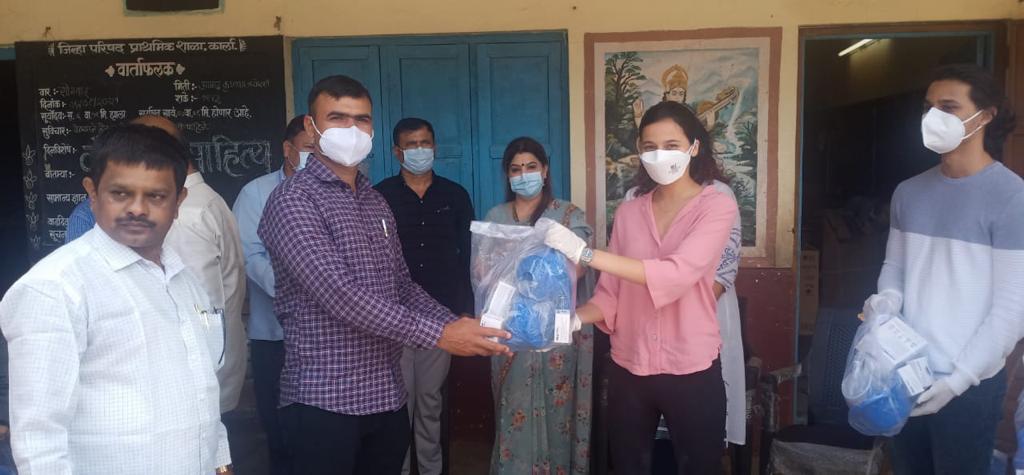2022-06-28
Beginning this year, Tehseen Contractor and four Global Health students focused a project on antibiotic resistance and artificial intelligence. ReAct got curious and wanted to hear a young Medical student's thoughts on antibiotic resistance in general, and artificial intelligence and antibiotic resistance in particular. Tehseen is from India and is studying Medicine and Surgery in the UK.

The course she just finished was held via Students for Global Health – AMR National Working Group training program. Tehseen Contractor and four other students just finished their project focusing on antibiotic resistance and artificial intelligence. She was briefly part of another organization called Polygeia, a student led global health research organization – they advertise many opportunities in global health and AMR national working group training program was one of these. The five students have been working from different universities in this project.
What made you interested in antibiotic resistance?

– Being an international student from India and seeing the wide and varied practices of prescribing antibiotics between the two countries made me really interested in antibiotic resistance. I was particularly interested in over the counter sale of antibiotics and the difference in culture of people in using antibiotics. However it was quite surprising that a lot of medical students do not know much about this in this country as well as India and students for global health provided me with a platform to pursue this interest.
In your project you focused specifically on artificial intelligence and antibiotic resistance. How do you think artificial intelligence can help address antibiotic resistance?

– Artificial intelligence is a very powerful tool that can both help prevent and curb antibiotic resistance. Collecting large amounts of appropriate data can help form useful antibiotic prescription guidelines especially in developing countries like India where antibiotics are often over-prescribed.
– Artificial intelligence can also be used as a tool to remind doctors when to and when not to prescribe certain antibiotics specific to their region based on existing data and can be an important training tool. However, artificial intelligence can be quite expensive and may not be feasible to be used across India.
What is one thing that you would like to highlight that you learned during this course?
– I discovered the true scale of the problem that antibiotic resistance and also that it is a common misconception that antibiotic resistance only affects one person if they become resistant to a certain drug.
– I learned that although a lot of work can be done in terms of artificial intelligence and antibiotic resistance, it is equally important to make the public and healthcare professionals aware about antibiotic resistance in innovative ways and that might be a cheaper alternative to using only artificial intelligence in developing countries. This might include antibiotic resistance related activities in schools or an addition to medical school curriculums and awareness campaigns for the public, doctors and pharmacists.
Are you worried that antibiotic resistance could affect your generation’s future?
– I definitely think antibiotic resistance will impact our generation’s future because like climate change it is getting worse for everyone and it needs to be a collective effort in order to contain the problem.
– Although antibiotic resistance is quite topical in the western world, it is still not spoken about frequently in a lot of developing countries. As a result this impacts the prescription habits of many doctors from these countries and this needs to be changed.
What do you think is the biggest challenge in tackling antibiotic resistance?
– I think one of the biggest challenges of tackling antibiotic resistance is the complexity of the issue and the fact that it affects such a large population. The responsibility to tackle it falls on the shoulders of multiple different organizations who may or may not be willing to coordinate.
– Furthermore, it is not only impacts humans but also plants and animals which makes this topic very broad to deal with.
– In the context of India, the large population and widespread geographic area further add to the challenge.
– Other issues such as poverty, water sanitation and hygiene, nutrition and other infectious diseases often take priority which results in antibiotic resistance receiving low political and financial priority.
Considering that containing antibiotic resistance is a complex, long and a slow process, what motivates you to keep working on this issue?
– Being part of a group of like-minded students that are all equally passionate really motivates me to continue working on this issue. Additionally antibiotic resistance is not a standalone issue and coincides with many other topics such as surgery, infectious diseases and education. Looking at the same issue from different perspectives of different topics makes researching and advocating for this issue more interesting.
What are you most proud of in the context of your studies?

– In the context of my studies and medical degree, I am most proud of how I have been able to apply what I have seen and learnt both in India and the UK. For example learning about antibiotic resistance at university encouraged me to join this training program and now I have become a co-lead of the national working group and this year we are planning to expand the training program internationally so that we can learn from students in different countries via an exchange program.
Is there something particular that you hope to accomplish in the future?

– Although it is quite ambitious, I hope to make healthcare more equitable in my hometown in India. Seeing the stark differences between how services differ in Leeds and Lonavala, I hope to reduce these disparities using what I have learned in the UK.

– Last year during the pandemic, I started an initiative with my friends where we conducted educational classes and fun extracurricular activities for a minimal cost for people who could not afford these classes. Using this money, we funded treatment of patients who could not afford their own COVID-19 treatment. Moving forward we are planning to increase breast cancer awareness and uptake of screening in my town using the help of healthcare professionals and charities both in India and the UK.
– As part of my degree I am also exploring the challenges and barriers of using electronic medical records in India and hopefully that can provide some useful information in the context of antibiotic resistance as well.
More from "2022"
- 15 things that need to happen in 2023 – for a robust response on antibiotic resistance!
- 7.7 million people die from bacterial infections every year
- ReAct highlights during World Antimicrobial Awareness Week 2022
- Awareness walk in Lusaka, Zambia
- ReAct Asia Pacific: Competitions, webinars, social media campaigns and new Indonesian declaration on AMR
- Otto Cars awarded Research!Sweden’s Honorary Award
- Innovate4Health: 16 finalists from 12 countries!
- Otto Cars has dedicated his life to the fight against antibiotic resistance
- ReAct activities for World Antimicrobial Awareness Week 2022
- ReAct Asia Pacific: Antibiotic Smart Communities as a way forward
- Webinar ReAct Asia Pacific! Moving towards an Antibiotic Smart Community – the use of a novel indicator framework
- Join ReAct Latin America Meeting: Empowered Communities!
- The impact of antibiotic resistance on cancer treatment, especially in low-and middle-income countries, and the way forward
- Sweden: Pernilla’s 8-day old daughter died from sepsis – caused by resistant bacteria Klebsiella
- Five challenges that governments need to address in resolving the stagnation in antibiotic development
- The monkeypox outbreak: Need for antibiotic stewardship?
- Key takeaways from the ReAct Africa and South Centre Conference
- New ReAct Europe and EPHA position paper on EU incentives for new antibiotics development
- Launch of a new approach to antimicrobial stewardship in Zambia
- Time to register for the annual ReAct Africa and South Centre conference!
- Innovate4Health 2022: Call for student team applications!
- “Need to address the paradox of hospitals spreading disease” says new WHO report
- 5 takeaways from AMR Stockholm+50 event
- Student Tehseen Contractor
- ReAct Latin America: call to governments on the use of antimicrobials in intensive animal husbandry
- Join ReAct Stockholm+50 associated event! Global AMR response – What needs to be done?
- New opportunities for global action on AMR?
- Public hearings on elements to be included in a new international instrument on pandemic preparedness & response
- Policy briefing on WHO GAP AMR: 8 pillars of action to address global solutions to AMR
- India: State Action Plans on AMR in focus at stakeholder colloquium
- The silence is killing us – time to listen to the facts
- Access to clean water – a fairly inexpensive way to avoid infections
- Anna Sjöblom new Director ReAct Europe
- Dr. Hari Paraton: Drug resistance bacteria threatens lives of mothers and newborns
- Antibiotic resistance claims more than 1,2 million lives a year, says new large study
- Artificial intelligence – the future of antibiotic resistance prevention?
